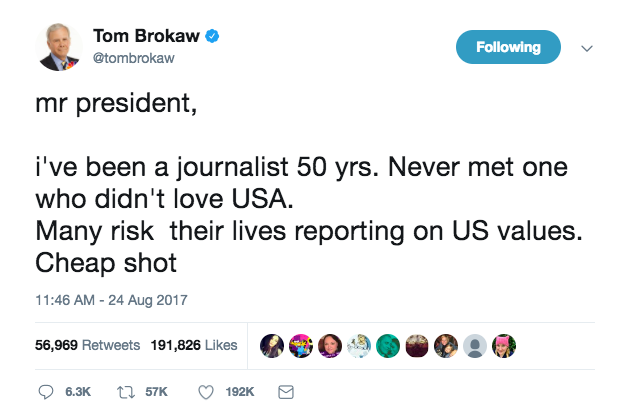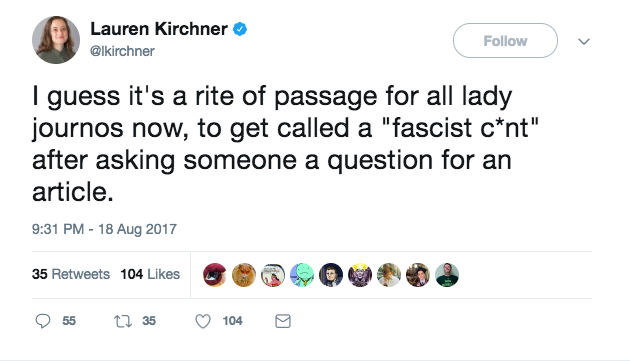US — #WeeklyAddress August 21 – 27: “Incitement, plain and simple”: attacks on media transcend Trump’s rhetoric
Below are the most notable incidents regarding threats to press freedom in the US during the week of August 21 – 27:
Trump targets “dishonest media” during Phoenix rally
President Donald Trump criticized the media during a significant portion of his 72 minute campaign rally in Phoenix, Arizona, blaming them for race relations in the United States. The rally, which was held on Tuesday, August 22, was his first since the violent protests in Charlottesville.
"For the most part, all they do is complain,” Trump said. “These are really, really dishonest people and they're bad people and I really think they don't like our country. I really believe that," he continued. His remark provoked a response from the legendary journalist Tom Brokaw, who tweeted on August 24: “mr president, i've been a journalist 50 yrs. Never met one who didn't love USA. Many risk their lives reporting on US values. Cheap shot”
Trump continued to defend his own statements on the Charlottesville protests, saying “the only people giving voice to these hate groups is the media itself and the fake news.” He riled the crowd up and pointed back at the press, invigorating the audience to chant “CNN sucks,” among other things. Cecilia Vega, who was covering the rally for ABC News, described Trump’s speech as “incitement, plain and simple.” She continued: “It really feels like a matter of time, frankly, before someone gets hurt.” Neither CNN nor ABC reported any physical threats against them.

Reporters get caught in the crossfire covering protests in Berkeley, Phoenix
While President Trump spoke inside the Phoenix Convention Center on Tuesday, August 22, confrontation between anti-Trump protesters and law enforcement resulted in the police’s deployment of pepper spray, smoke, tear gas, and stun grenades into the crowd. At least 17 reporters from the Arizona Republic “were caught up in the gas or spray and the aftermath — burning eyes, coughing, vomiting, burning skin,” according to Nicole Carroll, editor and vice president of news at the Republic. The next morning, Carroll reported that she received an email from “M Eliot” that said: “It is refreshing to know that the most powerful politician in the world is not kowtowing to the backbiters you in the Fake News Media have become. The battle lines have been drawn.” When Carroll responded asking for more information, she received no response.
Some journalists were reportedly assaulted or harassed at a protest in opposition to what was set to be a far-right, Anti-Marxist demonstration in Berkeley, California, on Sunday, August 27. Though the “Say No to Marxism” protest was cancelled, thousands of locals, peaceful protesters, anarchists, and antifascists showed up at Martin Luther King Jr. Civic Park to demonstrate against the small groups of right-wing protesters that were gathering. KTVU FOX2 reporter Leigh Martinez was one of the journalists shoved by a counter-protester while filming the demonstration. Others were harassed by antifa and anarchists who, according to the San Francisco Chronicle’s Lizzie Johnson, shouted things like, “Take his camera, take his phone!” at journalists.
Propublica reporters barraged with threats following reporting on hate groups, trolls
Reporters at ProPublica received a volume of attacks so high that on Tuesday, August 22, the entire staff lost access to incoming mail for more than five hours, according to The New York Times. The harassment came after the investigative news website published an article on Friday, August 19, about the ways major technology companies like Paypal and Amazon facilitate the financing of hate groups, despite having policies that say they don’t do business with such groups.
Reporter Julia Angwin, who contributed to the article, said on Twitter that her email address was made “unusable” when trolls began signing her up for subscriptions at a rate of 15 per minute. She tweeted on August 22: “It does seem like killing a reporters email account is the definition of a chilling effect, no?” Another contributing reporter, Jeff Larson, reported on Twitter that he had been signed up for “tons” of Wordpress accounts the same day.
Lauren Kirchner, another ProPublica reporter who contributed to the story, tweeted on August 18: “I guess it's a rite of passage for all lady journos now, to get called a "fascist c*nt" after asking someone a question for an article.” Her email address was also rendered inoperable for the entire day on August 22.
The next day, on August 23, the news outlet was smeared via Twitter by what appears to be a Russian bot whose sole tweet, which called the outlet “alt-left” and “#FakeNews,” received more than 23,000 retweets. The smear campaign was in response to an article ProPublica’s Isaac Arnsdorf published that day titled, “Pro-Russian Bots Take Up the Right-Wing Cause After Charlottesville.”

Martin Shrekli creates websites to ridicule reporters who covered him unfavorably
Since the beginning of the year, the controversial former pharmaceutical executive Martin Shkreli purchased internet domains of 12 journalists who have written or tweeted critically of him, and has now begun to customize the websites by mocking the reporters, according to a Business Insider report published on Tuesday, August 22. A website named after Vanity Fair tech reporter Maya Kosoff says: "Here we honor one of the most vibrant Social Justice advocates today," an allusion to the term “social justice warriors,” a derogatory term used to describe people who pursue socially progressive causes. On the day Twitter suspended Shkreli’s Twitter account for harassing journalist Lauren Duca, he created a website called MarryMeLauren.com
In an interview with Business Insider, Shkreli said, "I wouldn't call these people 'journalists.' They are the unwitting recipients of liberalism subsidy from large media and telecom companies," adding that they are "only a few notches above the white supremacists we hear so much about these days."
The United States ranks 43rd out of 180 countries in RSF's 2017 World Press Freedom Index after falling 2 places in the last year.
For the latest updates, follow RSF on twitter @RSF_en.



